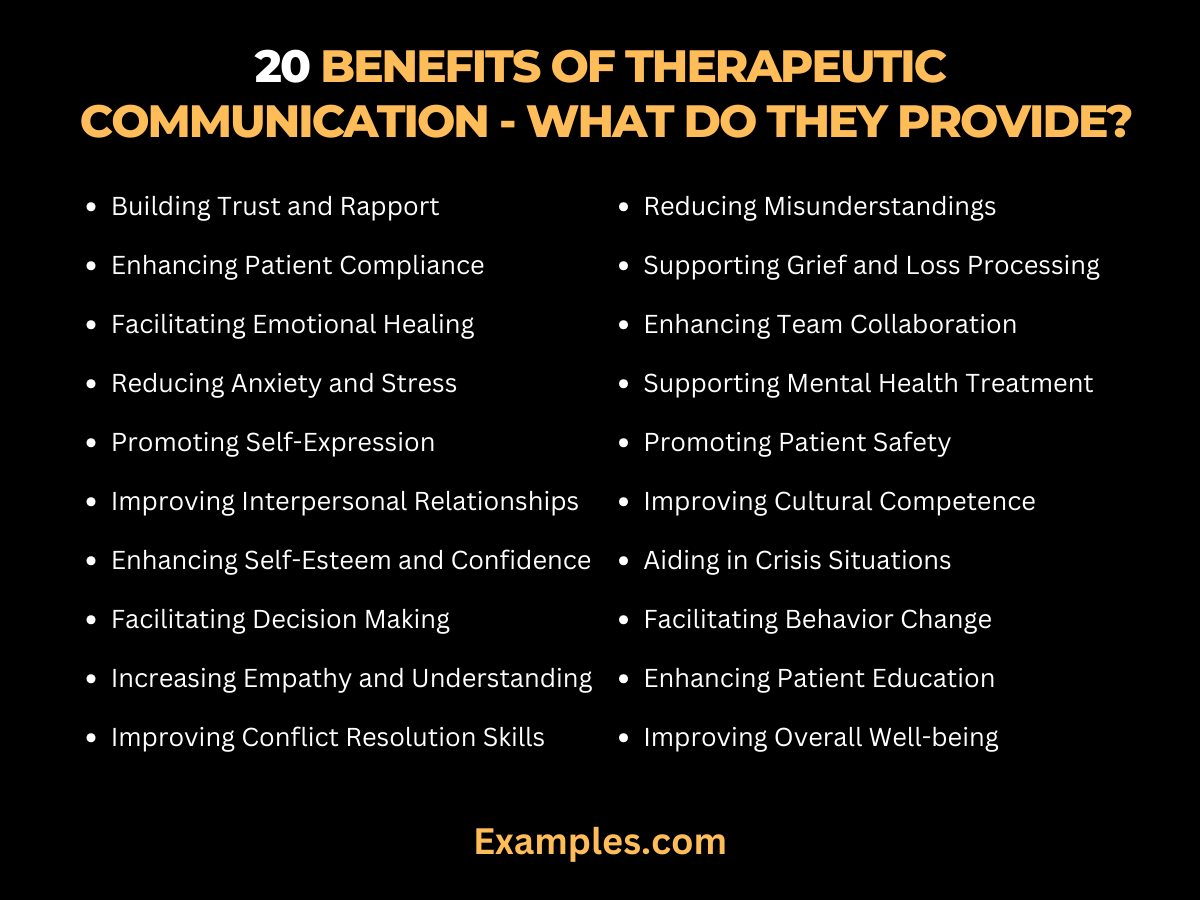19+ Benefits of Therapeutic Communication Examples
Embark on a journey through the world of Therapeutic Communication and discover its myriad benefits. This guide illuminates how these techniques enhance interactions in various settings, from workplaces to educational environments. Here, you’ll find oral communication examples that bring these concepts to life, illustrating their practical application. This introduction serves as your gateway to understanding the profound impact of Therapeutic Communication in fostering more meaningful and effective exchanges.
What are Benefits of Therapeutic Communication – What do they provide?
The benefits of therapeutic communication are the positive outcomes that result from using specific communication techniques in various settings. These benefits include improved understanding, stronger relationships, and better emotional support. Therapeutic communication helps individuals feel heard and valued, fosters trust, and can lead to more effective problem-solving. It’s particularly useful in healthcare, education, and the workplace, enhancing interactions and promoting a supportive environment. This approach to communication is about connecting with others in a way that is respectful, empathic, and empowering.
20 Benefits of Therapeutic Communication – What do they provide?
Explore the transformative power of Therapeutic Communication through our comprehensive guide, highlighting 20 key benefits. This overview showcases how effective therapeutic communication can enhance personal and professional relationships, improve mental health treatment, and foster a deeper understanding between individuals. From building trust to facilitating emotional healing, each benefit is illustrated with detailed examples and communication strategies. Ideal for healthcare professionals, educators, and anyone interested in the art of effective communication, this guide provides insights into making meaningful connections and creating supportive environments through skillful and empathetic dialogue.

- Building Trust and Rapport: Therapeutic communication establishes a foundation of trust, essential for effective interaction. For instance, a therapist uses open-ended questions and empathetic responses to create a safe space for clients, encouraging honest and open communication.
- Enhancing Patient Compliance: Clear, empathetic communication improves patient understanding and cooperation in treatment plans. A nurse explaining medication benefits in a caring, understandable manner leads to better patient adherence to the prescribed regimen.
- Facilitating Emotional Healing: By providing a non-judgmental space, therapeutic communication allows individuals to express and process emotions, aiding in emotional healing. A counselor’s empathetic listening and validating responses help clients navigate through their emotional turmoil.
- Reducing Anxiety and Stress: Therapeutic communication techniques like active listening and empathy can significantly reduce anxiety and stress in individuals. When a healthcare professional attentively listens to a patient’s concerns and responds with understanding, it can alleviate the patient’s anxiety.
- Promoting Self-Expression: Encouraging clients to articulate their thoughts and feelings enables self-expression, an important step in therapy. For example, a therapist uses reflective techniques to encourage a client to explore and express their inner thoughts.
- Improving Interpersonal Relationships: Skills learned through therapeutic communication can enhance personal relationships. For instance, a person applying active listening and empathy in their daily interactions fosters deeper, more meaningful relationships.
- Enhancing Self-Esteem and Confidence: When individuals feel heard and understood, it boosts their self-esteem. A teacher using affirmative and supportive language helps students build confidence.
- Facilitating Decision Making: Therapeutic communication helps clarify thoughts, enabling better decision-making. A counselor helps a client weigh options and consequences through guided discussions, leading to informed decisions.
- Increasing Empathy and Understanding: Engaging in therapeutic communication enhances one’s ability to empathize and understand others’ perspectives. A psychologist demonstrates this by acknowledging and validating a client’s experiences.
- Improving Conflict Resolution Skills: Effective communication techniques aid in resolving conflicts amicably. A mediator uses non-confrontational language and seeks common ground to resolve disputes.
- Reducing Misunderstandings: Clear and precise communication minimizes the chances of misunderstandings. A doctor ensures understanding by using simple language and confirming the patient’s comprehension.
- Supporting Grief and Loss Processing: Compassionate communication provides support to those experiencing grief. A grief counselor uses a gentle tone and comforting words to help individuals process their loss.
- Enhancing Team Collaboration: In a team setting, therapeutic communication promotes collaboration and mutual respect. A team leader using inclusive language and encouraging feedback fosters a cooperative environment.
- Supporting Mental Health Treatment: Therapeutic communication is integral in treating mental health issues. A therapist’s use of empathetic and validating language supports the treatment process.
- Promoting Patient Safety: Effective communication in healthcare settings can prevent errors and promote patient safety. A nurse confirms patient identity and explains procedures clearly to ensure safety.
- Improving Cultural Competence: Being aware of and sensitive to cultural differences in communication enhances therapeutic interactions. A social worker adapts their communication style to respect cultural nuances.
- Aiding in Crisis Situations: In emergencies, clear and calm communication is vital. An emergency responder uses concise and direct language to convey instructions effectively.
- Facilitating Behavior Change: Motivational interviewing, a therapeutic communication technique, encourages positive behavioral changes. A health coach uses open questions and reflective listening to motivate lifestyle changes.
- Enhancing Patient Education: Educating patients about their health is more effective with therapeutic communication. A dietitian uses clear examples and analogies to explain nutritional information.
- Improving Overall Well-being: Consistently engaging in therapeutic communication can lead to overall well-being. A person practicing these techniques in daily life experiences improved mental and emotional health.
Benefits of Therapeutic Communication – What Do They Provide? At Workplace
Therapeutic communication in the workplace is vital for creating a positive and productive environment. It fosters mutual respect, enhances team collaboration, and reduces workplace conflicts. Effective communication leads to better understanding among team members, improves problem-solving, and enhances employee satisfaction and well-being. This approach not only benefits individual employees but also contributes to the overall success of the organization.

- Resolving Conflicts Among Team Members: Use empathetic listening and non-confrontational language to mediate and resolve conflicts.
- Enhancing Team Collaboration: Employ inclusive language and active listening to promote teamwork and cooperation.
- Improving Manager-Employee Relationships: Managers using therapeutic communication build trust and understanding with their team.
- Facilitating Change Management: Communicate changes in a supportive and clear manner, reducing resistance and anxiety.
- Boosting Employee Morale: Recognition and empathetic responses enhance employees’ self-esteem and job satisfaction.
- Improving Customer Relations: Use therapeutic communication to understand and meet customer needs effectively.
- Enhancing Productivity: Clear and positive communication increases efficiency and reduces misunderstandings.
- Supporting Employee Mental Health: Create a supportive environment that acknowledges and addresses employee mental health concerns.
Benefits of Therapeutic Communication – What Do They Provide? For Students
In educational settings, therapeutic communication greatly benefits students by enhancing learning experiences, building confidence, and supporting emotional and mental well-being. It aids in developing a supportive and inclusive learning environment where students feel valued and understood. This type of communication promotes active participation, fosters a deeper understanding of the curriculum, and helps students develop essential life skills.

- Improving Teacher-Student Relationships: Empathetic and open communication builds trust and encourages student engagement.
- Supporting Students with Learning Difficulties: Tailoring communication to individual needs helps in overcoming learning barriers.
- Enhancing Peer Interactions: Promotes respectful and understanding interactions among students.
- Encouraging Active Participation: Students feel more comfortable participating in discussions when communication is supportive.
- Building Confidence and Self-Esteem: Positive and affirming communication boosts students’ confidence in their abilities.
- Aiding in Conflict Resolution: Helps students develop skills to resolve conflicts amicably.
- Supporting Emotional and Mental Health: Provides a safe space for students to express and process emotions.
- Enhancing Learning Outcomes: Clear and encouraging communication improves comprehension and retention.




